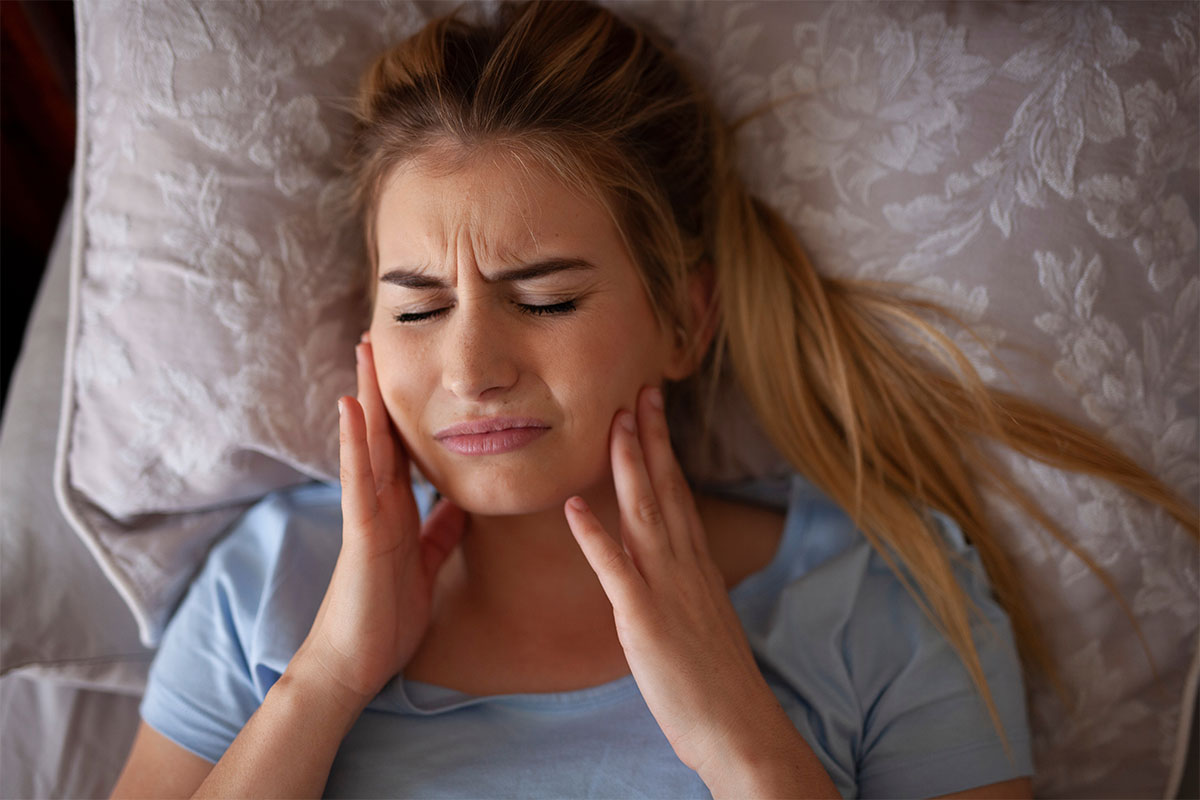
Do you grind your teeth or clench your jaw at night? Could this be Bruxism?
A significant number of us clench our jaws or grind our teeth – especially during sleep. Clenching and grinding are usually reactions to stress and heightened emotions including fear and anger, though can also occur multiple times daily without an immediate or obvious stressor. Some people (especially children) can become “addicted” to the sensation of grinding their back teeth.
Long-term, excessive jaw clenching and teeth grinding can significantly damage the teeth as well as harm the temporomandibular joint (TMJ). The tendency to grind or clench has ramifications not just on the integrity of your teeth and your general wellbeing, but also on the quality of your sleep – and even snoring.
What is Bruxism?
Bruxism is the clinical term for grinding, clenching, or gnashing the teeth. It is usually involuntary and can occur when one is awake or asleep.
In a lot of cases, bruxism is mild, occasional, and requires no treatment. If chronic and/or severe, however, and especially occurring during sleep, it can result in:
- Damaged teeth – worn enamel, molar flattening, chipped, cracked or loose teeth, tooth pain or sensitivity, increased risk of decay and cavities
- Daytime tiredness
- Jaw pain – muscular tightness and/or soreness in jaw muscles, sore temporomandibular (TMJ) joint, TMJ dysfunction
- Headaches
- Facial pain
- Altered facial structure (over a long time)
The Relationship Between Stress and Bruxism
According to a study published in 2019 in the Journal of Clinical Medicine, sleep bruxism is experienced by around 13% of adults.
Its causes may be:
- Biological – genetics and brain chemistry
- Psychosocial – sensitivity to stress, character and personality traits, mood, depression, and anxiety
- Exogenous – consumption of caffeine, alcohol, nicotine, medicines, and illicit drugs
Sleep bruxism occurs most in childhood and generally decreases with age, however, two-thirds of children with sleep bruxism will carry the habit into adult life. Up to 50% of people with sleep bruxism have a close family member who also experiences it, and there is no significant difference between the incidence for males versus females. Sleep bruxism is noted to occur more often alongside sleep disorders, cardiovascular disease, gastrointestinal disorders, and thyroid conditions.
While the abovementioned study determined that more research is needed into links between perceived stress levels and the severity of sleep bruxism, and whether stress is indeed a causative factor, it noted that the association between stress and sleep bruxism does exist.
How Do Stress and Bruxism Impact Sleep?
It’s a bit like the old question – “What came first, the chicken or the egg?”
Does poor sleep cause bruxism? Or does bruxism cause poor sleep? Or both?
Bruxism is a clear sign of stress, and both stress and bruxism can impact sleep quality in numerous ways. When we are stressed in some way, the muscles of the jaw can tense as part of the physiological fight-or-flight response – resulting in involuntary clenching and grinding. Furthermore, stress makes sleeping well challenging. Poor quality sleep increases the likelihood of also grinding your teeth while asleep.
Most bruxism occurs during lighter stages of sleep; fewer than 10% of bruxism episodes occur during REM or “dreaming” sleep. We also know that stress (and snoring) can inhibit the achievement of adequate REM and deep sleep. The poor quality sleep triggered by stress can lead to more bruxism in a “snowball” effect.
Help! What Are My Options?
- Know the Signs of Sleep Bruxism: regularly waking with headaches or jaw pain, pain at the top of the spine at the back of the neck, worn-down teeth, or sensitive teeth.
- Dental Treatment – repair or replacement of damaged teeth; can include crowns or dental implants.
- Mouth Guards – a dental “splint” may be used to separate the teeth and prevent the ability of the jaws to clench hard together. This also takes some pressure off the temporomandibular (jaw) joint and may reduce some muscle activity.
- Stress Management – to improve the body and mind’s stress response. Meditation, breathing exercises, and yoga can help, as can counselling if stress or a mood disorder is an ongoing issue for you.
- Behavioural Therapy – to increase bio-awareness and alter the resting position of the mouth and jaw to change the habit of clenching and grinding of the teeth.
- Avoid caffeine, alcohol, smoking, vaping, and illicit drugs.
- Know your risk if you take certain medicines – including some that are used to treat depression, ADHD, and seizure disorders.
- See a physiotherapist for advice and techniques to help – during the day, actively practice mindfully exercising and relaxing your jaw.
- A Massage of the head, neck, and shoulders may help.
- Get adequate exercise during the day – this has benefits for stress levels, general well-being, and sleep quality.
- Address snoring. Habitual snoring disrupts sleep, leads to daytime fatigue and an array of other issues, and increases your stress levels. Improving your sleep hygiene is also important.
You need to keep up with your regular dentist visits. As well as optimising dental health, regular clinical examinations can help identify signs of whether bruxism is occurring.
How Can SnoreMD Help?
Did you know that there is a link between bruxism and snoring?
Not only are people who have Obstructive Sleep Apnoea (OSA) more prone to bruxism, but scientific studies have identified an association between bruxism and non-OSA snoring.
By taking steps to prevent or minimise bruxism, you can potentially improve your snoring as well – and vice versa.
SnoreMD is a mandibular advancement device worn in the mouth during sleep that effectively helps to prevent snoring. It also limits your ability to grind your teeth while wearing it. Furthermore, if you do clench your teeth in your sleep, the cushioning material that SnoreMD is manufactured from prevents your top and bottom teeth from contact with each other, potentially slightly minimising the anatomical and physiological effects of clenching.
As such, SnoreMD is a great option for snorers who also clench or grind and may be used to replace night guards or splints that are designed to prevent teeth grinding alone.
Visit our website today to understand more about how SnoreMD works and to buy yours online. We also offer a wealth of valuable information about sleep and snoring in our News section.


